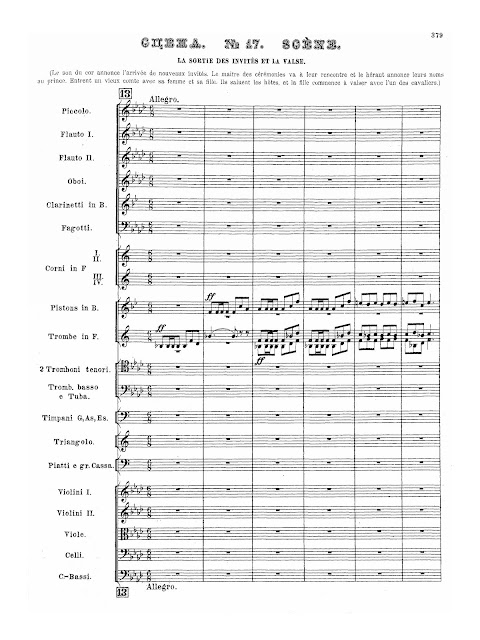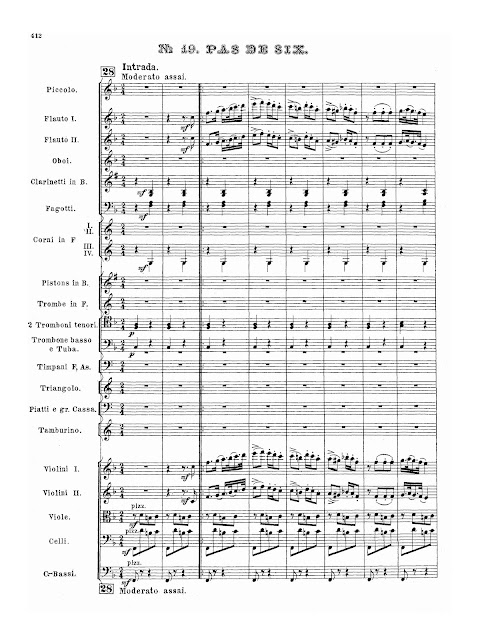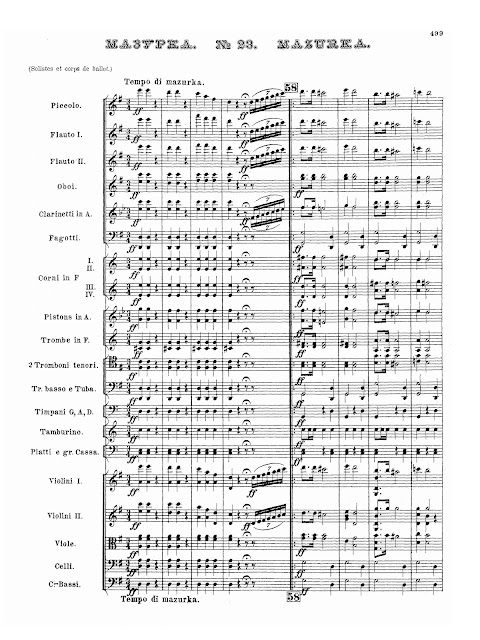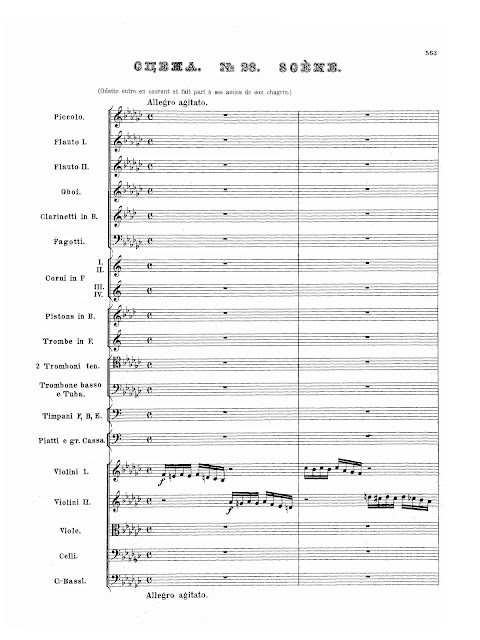CDXCII. TCHAIKOVSKY, Pyotr Ilyich (1840-1893)
Swan Lake
Kirov Theatre Orchestra
Viktor Fedotov, cond.
(1:55:41)
This is a complete production of the entire ballet by the Kirov Ballet. I have not credited any of the fantastic corps de ballet (this is a blog about music), but their names are in big white letters in the opening credits.
Even if you've been lucky enough to see a complete production, these Russians -- closest to the source material in both dance and music -- are the best of the best. If you only are familiar with the famous excerpts, here is an opportunity to see what the whole thing is all about!
**
Act One
Introduction
The oboe plays a melancholy theme associated with the bewitched swan-maidens to set the underlying mood of pathos and heartache.
No. 1 Scène.
Prince Siegfried and friends celebrate with wine and dance his coming-of-age the next day. Young peasants from the estate come and congratulate him.
No. 2 Valse.
A general celebratory dance.
No. 3 Scène.
Brass instruments herald the Prince's mother and her retinue. She reproaches her son for his self-indulgence and reminds him that he is expected to choose a bride from among the princesses to be presented to him on the morrow.
No. 4 Pas de trois.
Six short dances for two women and a man to entertain the company.
No. 5 Pas de deux.
Four short formal dances for the Prince and a ballerina. They became known as the "Black Swan" pas de deux after Petipa's production transposed it to Act Three.
No. 6 Pas d'action.
Wolfgang, the Prince's elderly tutor, joins the dancing, but falls victim to wine and age and cannot finish.
No. 7 Sujet.
Evening approaches. The Prince is persuaded to join a last dance.
No. 8 Danse des coupes.
No. 9 Finale.
The swan-theme indicates a sighting of the birds of flight. The Prince and his men leave to hunt them.
Act TwoNo. 10 Scène.
Set by the lakeside; swans glide majestically across the lake's surface.
No. 11 Scène
The swans appear, transformed into beautiful women. Their leader, Princess Odette, explains to Siegfried that she and her attendants have been transformed into swans by her evil stepmother and Rotbart, and can resume human form only at night. Only a vow of eternal love can break the spell and release them. Rotbart, who holds them in thrall, appears (a menacing brass climax) and threatens Siegfried.
No. 12 Scène.
Siegfried declares his love for Odette and invites her to attend his betrothal ball, promising to choose her as his bride.
No. 13 Danse des cygnes.
This consists of six linked dances: (a) a waltz for the swans; (b) a solo for Odette; (c) reprise of the waltz; (d) Dance of the Little Swans (a quick staccato number); (e) Grand Adagio pas de deux for Odette and Siegfried (based on a theme from Tchaikovsky's opera
Undine); (f) a spirited ensemble finale.
No. 14 Scène.
A reprise of No. 10. As dawn breaks, Rotbart returns to draw Odette away from the despairing Siegfried; the swans reappear on the lake.
Act Three
No. 15 Scène.
Guests assemble in the castle ballroom, joined by the Prince's mother with Prince Siegfried.
No. 16 Danse du corps de ballet et des nains.
A general dance; the nains (drawfs) seem not to have survived the first production.
No. 17 La sortie des invités et la valse.
Fanfares herald the presentation of the six prospective brides. Siegfried dances briefly with each of them during the waltz.
No. 18 Scène.
Siegfried displeases his mother by refusing to make a choice. A further fanfare signals Rotbart with his daughter Odile, whom he has magicked into the likeness of Odette.
No. 19 Pas de six.
An Entrée, five Variations and Coda for the prospective brides, musically depicting their differences of character.
Appendix I: Pas de deux.
The extra number Tchaikovsky composed for Anna Sobeshchanskaya at the ballet's fourth performance, consisting of an Entrée, two Variations and Coda, of which only Variation II is in Tchaikovsky's orchestration (the rest was orchestrated by
Vissarion Shebalin from a piano score).
No. 20 Danse hongroise.
A czárdás in traditional slow-fast form.
Appendix II. Danse russe.
A dance of pleasantly folksy character Tchaikovsky added for the ballet's premiere at the request of
Pelagia Karpakova.
No. 21 Danse Espagnole.
Bolero tempo, with prominent castanets.
No. 22 Danse napolitaine.
A serenade on solo cornet, leading to a tarantella with rhythmic tambourines.
No. 23 Mazurka.
The energetic Polish dance played by the full orchestra.
No. 24 Scène.
Siegfried chooses Odile as his bride. Rotbart insists he swears eternal love, then shows him a vision of Odette, still trapped, and they rush from the castle. The Prince follows in pursuit.
Act Four
No. 25 Entr'acte
The music is from Tchaikovsky's earlier opera,
The Voyevode.
No. 26 Scène.
The swan-attendants wait for Odette by the lakeside.
No. 27 Danse des petits cygnes.
A sad dance for some of the swans.
No. 28 Scène.
Odette returns in despair. Storm-music develops, and a contrite Siegfried arrives in search of her.
No. 29 Scène finale.
Siegfried begs Odette's forgiveness, but she dies in his arms. He takes the coronet from her head and casts it into the lake, the waters rise and engulf them. As they subside, swans are seen gliding silently into the distance.


































No comments:
Post a Comment